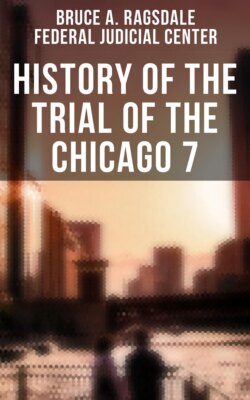Читать книгу History of the Trial of the Chicago 7 - Bruce A. Ragsdale - Страница 36
На сайте Литреса книга снята с продажи.
The attorneys for the defendants
ОглавлениеTable of Contents
William Kunstler and Leonard Weinglass, attorneys for the seven defendants, rejected a strategy that focused closely on disproving the charges in the indictment. Rather, they emphasized that this was, in their view, more of a political trial than a criminal prosecution. The defense called many witnesses to rebut the testimony of the undercover police, but their goal was always to establish the peaceable intent of the defendants and to expose the political motivation of the prosecution. In their opening and closing arguments, the defense attorneys argued that:
1 The U.S. and Chicago governments engaged in a conspiracy to prevent demonstrations against the Vietnam War and related issues. Kunstler argued that “the police of this city embarked on an organized conspiracy of berserk brutal action against these demonstrators.”
2 The prosecution witnesses, who were almost all government employees or informants paid by the government, could not offer impartial or credible testimony. The defense asked the jury to consider why the government had called no by-standers as witnesses of the violence during the convention.
3 The indictment, and particularly the conspiracy charge, was on the face of it absurd. The charges in the indictment implied that seven veterans of the peace movement suddenly rejected their long-standing beliefs and embraced a violent strategy sure to result in their imprisonment.
4 A large number of witnesses, including prominent politicians and entertainers who performed at the protest rallies, testified that they had heard no incitements to violence during the planning and staging of rallies surrounding the convention; nor had they witnessed any diversionary tactics designed to provoke police violence.
5 The indictment represented an assault on First Amendment rights. With their frequent reference to the American Revolution and the Founders, the defense attorneys placed the defendants’ activities in Chicago in an American tradition of popular defense of liberties.
